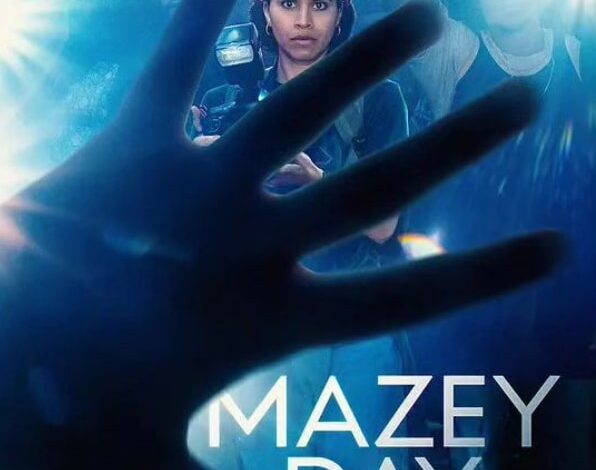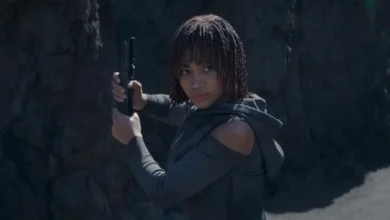Black Mirror Season 6: “Mazey Day” Episode Review 2023

At around 42 minutes, “Mazey Day” stands as the shortest episode of Black Mirror season 6. While not exceptional, sometimes a brisk pace and unexpected twists can inject a sense of fun, especially after enduring a lengthy episode.
Black Mirror Season 6: “Mazey Day” Episode
Films and TV shows about the early 2000s paparazzi abuse of female celebrities have become increasingly popular in recent years. These debates have centred on celebrities like Lindsay Lohan, Paris Hilton, and Britney Spears. Given Black Mirror focus on the failings of media, it’s no surprise that the series takes on this subject matter in a period piece.
The episode instantly immerses us in the year 2006 through various cues: the radio announcement of Tom Cruise and Katie Holmes’s daughter Suri’s birth, iPod Shuffles, and news coverage of the Iraq War. Our guide into this recent past is Bo (played by Zazie Beetz), a paparazzo who collaborates with a “snitch” named J.P. to capture compromising photographs of celebrities. In the opening scene, she captures photos of a closeted actor named Justin Canley leaving a motel room with another man. He offers her $500 for the pictures, but she drives away, ultimately selling them for $300 each.
Black Mirror Season 6: “Mazey Day” Episode ReviewThis is how Bo makes a living, but she grapples with inner conflict, especially after learning that Canley committed suicide after being exposed. Despite her paparazzo friend Hec (Danny Ramirez) reassuring her that it isn’t her fault, she knows, to some extent, it is. Her discomfort with her profession intensifies as she witnesses how her fellow paparazzi “friends” mistreat a celebrity resembling Britney Spears named Sydney Alberti. Not only does the repugnant Whitty provoke Sydney by calling her derogatory names, but he also accuses her of assault when she responds in the predictable manner of an overworked and scrutinized young woman.
While we delve into Bo’s world, we also spend time with the titular character, Mazey Day (played by Clara Rugaard), who resides on the other side of the symbiotic, albeit parasitic, paparazzi-celebrity relationship. One night, after a long day of filming the third installment of the popular EverWish saga in the Czech Republic, Mazey relaxes with a few glasses of wine and some hallucinogenic mushrooms. After cutting her finger on a broken glass, she decides to go for a drive to purchase more cigarettes. However, while staring at her finger pulsating with psychedelic patterns, she accidentally hits someone with her car and, after briefly inspecting the body, drives away.
Some time later, Mazey flees back to California to seek solace and sobriety. Two weeks later, Hec visits Bo at her new job at a coffee shop, tempting her with a promise of $30,000 for the first exclusive photo of Mazey (or $40,000 if she appears like a junkie). However, Bo’s contact J.P. doesn’t possess any information, leaving her to conduct her own detective work. She investigates the noodle shop that Mazey frequented, where she encounters a delivery girl who recently spotted Mazey at a producer’s house.
Bo keeps a watchful eye on the house while Mazey wrestles with the memories of the car accident. The following morning, the house lies in disarray, and Mazey is visited by Dr. Babich, a holistic doctor catering to celebrities. He offers her the usual lecture, stressing the need for humility and acknowledging her lack of control over her addiction. Babich recommends an isolated location outside of town where she can detox for a few days. Agreeing to the plan, Mazey drives off, with Bo discreetly trailing behind. Unfortunately, a member of Mazey’s security team tricks Bo into stopping at a nearby diner, puncturing her tires. From there, the trail goes cold momentarily.
However, the diner’s waiter shares information with Bo about Cedar Wood Retreat, an exclusive rehab facility catering to affluent bohemian types. Curiously, the entire complex is rented out for the weekend, accommodating just one patient. Convinced that Mazey must be the sole occupant, Bo contacts Hec to explore the premises. Regrettably, they are joined by Whitty and Duke, who discreetly plant a tracker on Hec’s bike.
Once the four paparazzi infiltrate the compound, they stumble upon a shocking sight: Mazey, in werewolf form, restrained to a bed and guarded by Dr. Babich and the man responsible for disabling Bo’s tires. It’s a satirical, exaggerated representation of the obscure New Age facilities used by real-life celebrities to privately address their issues.
It aligns with the episode’s core message regarding the exploitation of young female celebrities. Whether Mazey consented to this intense cold-turkey treatment or was kidnapped and forced into it remains unclear. Nevertheless, it’s an undeniably twisted situation. The essence of the episode crystallizes in the scene where Bo desperately breaks the restraints while the other three men continue snapping photos relentlessly, their cameras flashing like strobe lights.
Up until this point, “Mazey Day” maintains a solid pace, albeit with somewhat underdeveloped characters. However, the plot takes a surprising turn when the full moon emerges, revealing the biggest twist of the season: Mazey is a werewolf.
Black Mirror Season 6Reader, prepare to guffaw. The reveal isn’t entirely unexplained. It becomes apparent that the person Mazey hit with her car was a werewolf who bit or scratched her, thus transforming her into one. Yet, when we consider the story holistically, the werewolf twist lacks narrative and thematic coherence. How does Mazey’s lycanthropy intersect with her struggles as an addict?
Does she genuinely need to overcome her addiction, or was that subplot a mere red herring? Is Dr. Babich accustomed to treating werewolves? Are movie stars more susceptible to lycanthropy? These questions are left unanswered, sacrificing engagement with the central concept for the sake of preserving the twist.
Consequently, the final 15 minutes lean heavily into supernatural horror, with Mazey, now a werewolf, hunting down the paparazzi. She dispatches Whitty first, his obsession with capturing photos rendering him defenseless. Next, she kills Duke, dragging his lifeless body from beneath a fence. The climax occurs at the aforementioned diner, where she storms in, massacring everyone present except for a hiding Bo (and an unfortunate waiter accidentally shot by the police). Just as Mazey is about to attack Bo, the latter retrieves a fallen gun and shoots Mazey at the last possible moment.
In his final moments, Hec passes the camera to Bo, and Mazey reverts to her human form, gradually succumbing to her injuries. Mazey implores Bo to end her life, but instead, Bo hands her the gun, raising her camera to capture this young woman in the act of suicide, and possibly beyond. It’s a predictable yet fitting conclusion, reconnecting with the episode’s core themes after the detour into monster-movie territory.
Black Mirror’s sixth season, in general, departs from its sci-fi foundations by including episodes that are either set in the present or the past. “Mazey Day” not only serves as a period piece but also marks the show’s first foray into the supernatural realm (discounting the roaches in “Men Against Fire”).
While it may not rank among the series’ strongest entries or even this season’s best, it possesses its own B-movie charm. Once viewers accept the nonsensical twist and embrace the episode for what it is, they can derive mild amusement from it. Undoubtedly, higher expectations persist for the show, but given the choice, I’d opt for “stupid yet mildly fun” over “lengthy and profoundly dull” any day.
Conclusion
“Mazey Day” offers a whirlwind journey into the world of paparazzi and celebrity culture. The episode addresses the exploitation of female celebrities while introducing a supernatural twist. While the werewolf storyline may leave some questions unanswered, the episode manages to deliver its core message effectively. With its brisk pace and unexpected turns, “Mazey Day” offers a fun diversion in Black Mirror’s sixth season.
Frequently Asked Questions
- Is “Mazey Day” a stand-alone episode or connected to the broader Black Mirror universe?
“Mazey Day” is a stand-alone episode, separate from the interconnected narratives often found in Black Mirror. You can enjoy it without prior knowledge of the show.
- How does the episode explore the mistreatment of female celebrities?
The episode sheds light on the paparazzi’s invasive tactics and the media’s role in sensationalizing the lives of female celebrities, particularly during the early 2000s. It critiques the objectification and exploitation they endure.
- What role does the supernatural twist play in the episode?
The introduction of the supernatural element, with Mazey being a werewolf, adds an unexpected layer to the story. Although the twist might seem disconnected, it actually serves as a metaphor for how the media dehumanises celebrities.
- Is “Mazey Day” more horror-oriented than other Black Mirror episodes?
Yes, “Mazey Day” leans more toward supernatural horror, especially in its final moments. It diverges from the traditional sci-fi themes typically explored in Black Mirror, offering a unique take on the show’s storytelling.
- Can “Mazey Day” be watched independently, or should I watch previous Black Mirror episodes first?
“Mazey Day” is a self-contained episode, and you can watch it without any prior knowledge of Black Mirror. However, you might want to watch more episodes if you like how the show examines technology and society.
6. Is “Mazey Day” a suitable starting point for someone new to Black Mirror?
While “Mazey Day” can be enjoyed as a stand-alone episode, it might not provide a comprehensive introduction to the overall themes and style of Black Mirror. If you’re new to the series, it’s recommended to start with some of the earlier episodes to fully appreciate the show’s unique blend of technology and social commentary.
7.What sets “Mazey Day” apart from other Black Mirror episodes?
“Mazey Day” stands out among other Black Mirror episodes due to its incorporation of supernatural elements and its departure from the show’s typical futuristic and technological themes. It offers a different flavor while still maintaining the series’ dark and thought-provoking atmosphere.
8.How does “Mazey Day” compare to other episodes in Black Mirror Season 6?
“Mazey Day” offers a unique departure from the other episodes in Season 6 of Black Mirror. While it may not be considered one of the strongest episodes of the season, its blend of paparazzi culture, supernatural elements, and social commentary make it a distinctive addition to the series.



